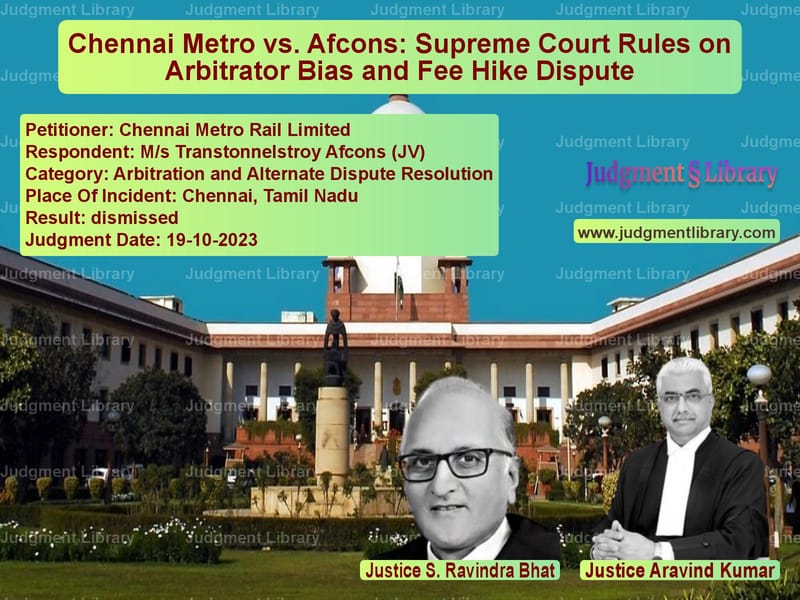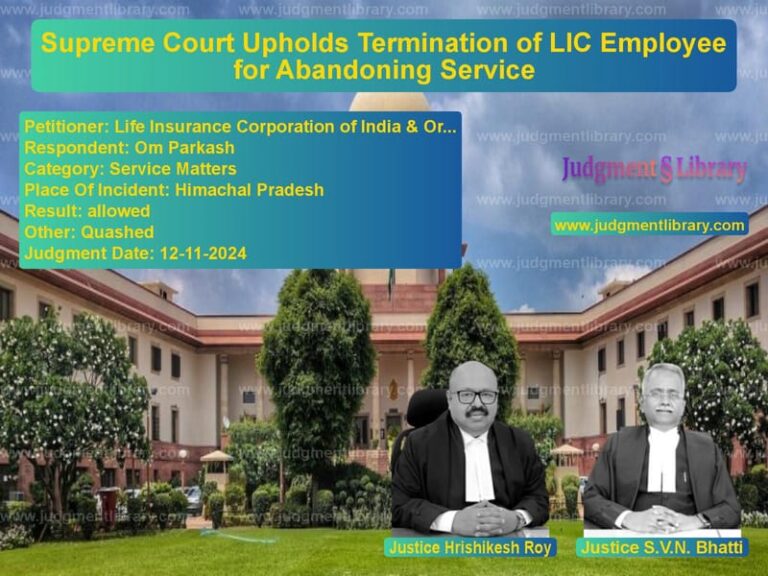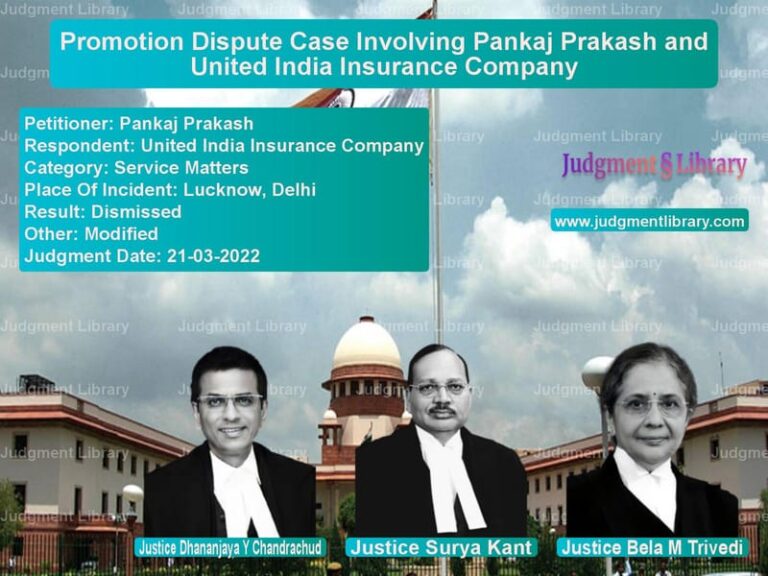Chennai Metro vs. Afcons: Supreme Court Rules on Arbitrator Bias and Fee Hike Dispute
The Supreme Court of India recently delivered a crucial judgment in the case between Chennai Metro Rail Limited and M/s Transtonnelstroy Afcons (JV) regarding the unilateral revision of arbitrator fees and allegations of bias. The case revolved around whether an arbitration tribunal could increase its fees unilaterally, and whether such an act created justifiable doubts about its impartiality. This ruling holds significant implications for arbitration proceedings in India, reinforcing the principles of party autonomy and procedural fairness.
Background of the Case
Chennai Metro Rail Limited (hereinafter referred to as ‘Chennai Metro’) had awarded a ₹1566 crore contract to M/s Transtonnelstroy Afcons (JV) (‘Afcons’). After disputes arose, arbitration proceedings commenced under the Arbitration and Conciliation Act, 1996. Initially, the parties had agreed to an arbitrator fee of ₹1,00,000 per session.
Read also: https://judgmentlibrary.com/supreme-court-rules-on-loss-of-profit-claims-in-arbitration-disputes/
However, during the proceedings, the tribunal unilaterally increased its fee to ₹2,00,000 per session. Chennai Metro objected to this increase, citing party autonomy, while Afcons agreed and paid the revised fee. The tribunal justified the increase, stating that it was uncertain when the Supreme Court would rule on the applicability of Schedule IV of the Arbitration Act regarding arbitrator fees.
Key Legal Issues
- Whether an arbitrator can unilaterally revise the agreed-upon fee without mutual consent.
- Whether such an act creates a reasonable apprehension of bias.
- Whether the mandate of the arbitral tribunal should be terminated under Section 14 of the Arbitration and Conciliation Act, 1996.
Petitioner’s Arguments (Chennai Metro)
Chennai Metro, represented by the Additional Solicitor General, contended that:
- The tribunal’s unilateral fee hike violated the principle of party autonomy.
- The refusal to acknowledge Chennai Metro’s objections created a reasonable apprehension of bias.
- Bias can take various forms, including financial bias, as emphasized in past Supreme Court judgments such as State of West Bengal vs. Shivanand Pathak and N.K. Bajpai vs. Union of India.
- The tribunal’s insistence on retrospective fee revision reinforced concerns of partiality.
Respondent’s Arguments (Afcons)
Afcons, represented by Senior Counsel, countered that:
- The application under Section 14 was not maintainable, as Chennai Metro had failed to raise its concerns before the tribunal first.
- The tribunal’s fee revision was consistent with previous proceedings where both parties had agreed to fee adjustments.
- A high threshold exists for establishing bias, and mere disagreement over fees does not justify terminating an arbitral tribunal’s mandate.
- Past judgments, such as HRD Corporation vs. Gas Authority of India Ltd., establish that minor disputes over fees do not constitute a de jure inability to act.
Supreme Court’s Judgment
The Supreme Court, in its judgment authored by Justice S. Ravindra Bhat and Justice Aravind Kumar, ruled in favor of Afcons, rejecting Chennai Metro’s plea. The court held:
- Arbitrator fee revision requires mutual consent: The tribunal had erred in unilaterally increasing its fees, as held in ONGC vs. Afcons Gunasa JV. However, such an error did not automatically render the tribunal biased.
- No real likelihood of bias: While Chennai Metro had concerns over impartiality, the court found no substantive evidence of actual bias. The affidavits submitted by the arbitrators reaffirmed their commitment to impartiality.
- Statutory mechanism must be followed: Section 13 of the Arbitration Act requires parties to challenge arbitrators before the tribunal first. Chennai Metro had bypassed this step and directly approached the High Court, which was procedurally incorrect.
- Termination of tribunal not warranted: The court emphasized that minor procedural lapses should not lead to abrupt termination of an arbitral tribunal.
Implications of the Judgment
This ruling clarifies several aspects of arbitration law in India:
- Party autonomy remains sacrosanct: Arbitrator fees cannot be revised without the consent of all parties.
- Challenges to arbitrators must follow statutory procedure: Any doubts regarding impartiality must first be raised before the tribunal.
- Bias must be proven objectively: Mere apprehension or disagreement over procedural matters is insufficient to establish bias.
Conclusion
The Supreme Court’s decision in this case reinforces the importance of procedural discipline in arbitration. While tribunals must adhere to party agreements regarding fees, minor deviations do not automatically disqualify them. Businesses engaging in arbitration should ensure that concerns regarding impartiality are raised at the appropriate stage to avoid procedural pitfalls.
Petitioner Name: Chennai Metro Rail Limited.Respondent Name: M/s Transtonnelstroy Afcons (JV).Judgment By: Justice S. Ravindra Bhat, Justice Aravind Kumar.Place Of Incident: Chennai, Tamil Nadu.Judgment Date: 19-10-2023.
Don’t miss out on the full details! Download the complete judgment in PDF format below and gain valuable insights instantly!
Download Judgment: chennai-metro-rail-l-vs-ms-transtonnelstroy-supreme-court-of-india-judgment-dated-19-10-2023.pdf
Directly Download Judgment: Directly download this Judgment
See all petitions in Arbitration Awards
See all petitions in Dispute Resolution Mechanisms
See all petitions in Arbitration Act
See all petitions in Enforcement of Awards
See all petitions in Judgment by S Ravindra Bhat
See all petitions in Judgment by Aravind Kumar
See all petitions in dismissed
See all petitions in supreme court of India judgments October 2023
See all petitions in 2023 judgments
See all posts in Arbitration and Alternate Dispute Resolution Category
See all allowed petitions in Arbitration and Alternate Dispute Resolution Category
See all Dismissed petitions in Arbitration and Alternate Dispute Resolution Category
See all partially allowed petitions in Arbitration and Alternate Dispute Resolution Category







